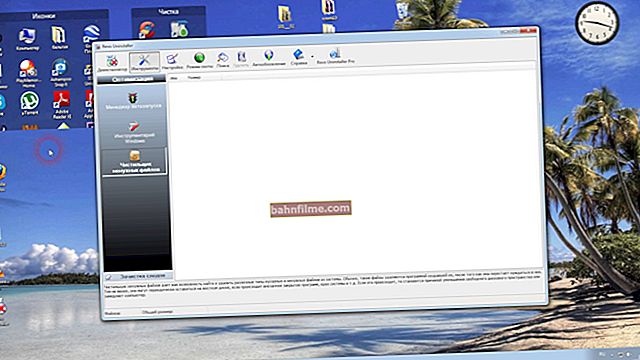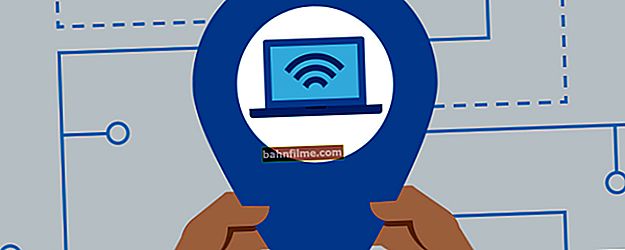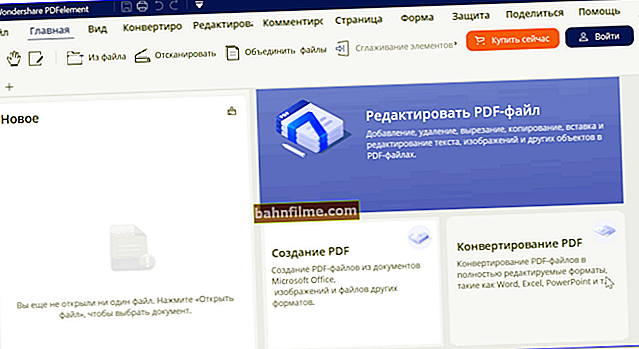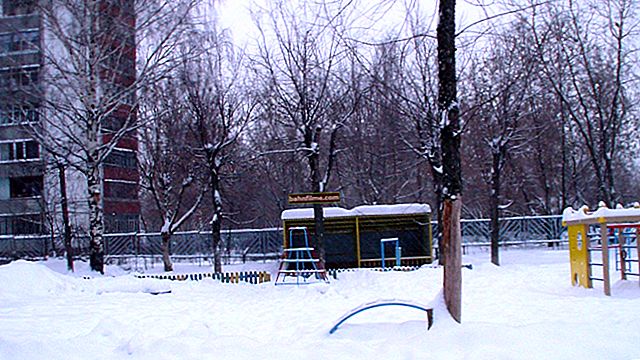 Good day!
Good day!
If you often work at a computer, then the problem of efficiency is familiar to you. Sometimes you can do as much in one day as you cannot do in 3-4 days later. Why is this happening?
It's about how we use our time. Sometimes, like opened social. the network just to check the messages - you look at the time, and already half an hour or an hour has flown  .
.
Actually, in this article I decided to share my thoughts and tips that will help you work more productively at your computer (if, of course, you keep them). To be honest, I myself cannot always force myself to comply with these seemingly simple rules (but I managed to make sure that they work!).
So let's get down to business ...
*
Improving the efficiency of your work on the computer
Most of the time is wasted when we are at work distracted ... And there are actually plenty of "distractors": here you have a phone (with its messengers, SMS, etc.), social. networks, video hosting, etc.
Therefore, first of all (in my opinion) it is necessary to solve this problem. Everything else is secondary ...
How not to be distracted when working at a PC
1) For reading social. networks, mail, messages in messengers, etc., allocate time
As one of the options for solving the problem: you can take the social. networks, mail and other "good" 3-4 five minutes during the day. For questions that require a big meaningful answer: answer in the evening. On the working day - only operational and urgent questions that will not take much time.

Skype status (as an example)
You can also set the status in messengers that you are busy and answer everyone, but later (you can even specify the time when you usually do this).
2) About email
When it comes to email, there are a couple more things to recommend:
- get yourself 2 boxes: one - a worker (where there will be few messages, and only on business); the second is personal (which does not need to be checked often, and where the answer can be given in the evening). The best services for creating e-mail;
- unsubscribe from unnecessary mailings;
- set up spam mailing rules (to remove everything you don't need).
3) Organize your desktop
Many have something on their desktop: documents from a year ago (which no one needs anymore), non-working shortcuts, some kind of archives, programs, etc. In order not to be distracted and not wasting time on them, put them in the most common order:
- remove everything that you have not used for a long time (programs that you run every day - put in the most prominent place);
- create several folders on the desktop and move some of the shortcut documents into them (for example, you can put all new files that you have not parsed into the Inbox folder);
- group different shortcuts in different places: office software in one corner, utilities in another corner, documents in the third ...

On the left is a mess, on the right is order for the slave. desktop pc
By the way! I would especially recommend removing shortcuts to various games, etc. from the desktop. You can simply create a "Games" folder on your desktop and move all the shortcuts to games into it. Thus, every time you turn on the computer, you will not see these bright inviting "covers" and click on them (with thoughts I will only for 5 minutes ...).
4) Force yourself to work for at least 5 minutes!
If you cannot force yourself to work even one hour, then there is one interesting "technique". Try to force yourself to sit on the task you need for at least 5-10 minutes. For such a short period of time - is it possible ?!
But, as soon as you start doing and get involved - you yourself will not notice how not 5 minutes will fly by - but all 35 (or even an hour)!
5) Don't sit down at a PC without a specific purpose
We are often distracted at the computer when we do not have a clear and specific goal.Remember yourself, when you urgently needed to write a report / diploma - you simply did not have a desire in your thoughts to see something, read ...
The message of this thought is short: just do not sit down at the PC if you have not yet formed a goal and a plan in your head (otherwise you will be distracted, and it will not appear today  ).
).
6) Break down tasks by importance, and do it one at a time
Many users make one mistake: when they do something, they immediately try to be in time both there and here. As a result, both cases "stall", and there is a monstrous waste of time.
The best option is to break all the cases according to the degree of importance, and then start solving them one by one. The first thing to do is to do the work that is most important to you (leave the entire routine for the afternoon / evening).
In addition, many experts have noticed that a person can work most effectively up to 3-4 hours a day. That is why your max is important. to devote efficiency to the most difficult task!
7) It is highly desirable to work in silence
If you are constantly distracted by something (some noise, fuss, etc.), you will not be able to show high productivity. It is highly advisable to either eliminate sources of noise, or choose a working time when no one and nothing distracts.
You can partially protect yourself from noise with headphones with quiet music (Where you can listen to music for free and legally ♫ - //ocomp.info/slushat-besplatno-muzyiku.html).
8) Plan!
It is impossible to keep in mind all the things that you want to do in the near future. Either you will forget something, or you will constantly think about it and be distracted from the current work. As Sherlock Holmes said there:
"... Watson, understand: the human brain is an empty attic where you can stuff anything you want ...
Only the tools I need are in my attic. There are many of them, but they are in perfect order and always at hand. And I don’t need extra junk. ”
Basically, he's right. Nowadays, you can even install any application on your smartphone and record all the turnover (and the application will automatically remind you of them).
If you touch me (  ), then I generally use the most ordinary paper notebook where I write down everything that needs to be done in the coming week ...
), then I generally use the most ordinary paper notebook where I write down everything that needs to be done in the coming week ...
How to improve your productivity
Let's say that now you are less distracted.  (and this is a huge step forward). However, there are still a few things you can tweak to improve your efficiency and productivity.
(and this is a huge step forward). However, there are still a few things you can tweak to improve your efficiency and productivity.
1) Clean and optimize your Windows
Many users have never "cleaned" or optimized their Windows at all. Every day they waste time when turning on and loading the OS, when opening browsers, performing routine operations.
And you can significantly save time only by optimizing Windows. I have dozens of blog articles devoted to this, so here are links to them:
- optimization of Windows 10 - //ocomp.info/super-optimizatsiya-windows-10.html
- the best software for removing garbage from the system: //ocomp.info/programmyi-dlya-ochistki-musora.html
- best free antiviruses (check also will not be superfluous, what if your PC slows down due to viruses?) - //ocomp.info/besplatnyiy-antivirusnyiy.html
2) Remove all unused programs
Check the list of programs and remove everything unnecessary from it: that you have not used for the last six months or a year. Superfluous programs only "in vain" take up space on the hard disk and "climb" into Windows startup, significantly slowing down the start of the PC ...

Uninstall a program (Windows 10 Control Panel) | clickable
Note!

If you cannot remove any program in any way (in the classic way), use a special utility to force the removal of any software. I sketched a note about one of these: //ocomp.info/programma-dlya-udaleniya-programm.html
3) Try to automate all routine processes
If you often have to do the same operations at the computer (the so-called routine), try to automate it. For example, you can do some calculations in Excel (instead of a calculator), install a utility for auto-switching layouts (also saves time), etc.
In general, now there are a lot of different software that allows you to emulate even the clicks of a mouse button, keyboard in the same browser and office programs. There is where to go ...
4) Get yourself a comfortable table / chair / stand, etc.
Now a lot of different "fashionable" furniture is being sold, sitting behind which, hands, shoulders become numb, neck gets tired (ie the monitor is higher than eye level, you are sitting somehow sideways, the keyboard is somewhere below on a stand ...). Why overpay for it if your performance drops behind it? (a rhetorical question)
I already mentioned this in one of my previous articles: //ocomp.info/kak-sohranit-zdorove-za-pc.html

How to properly sit at the PC
Of course, if you buy a normal computer chair (with a backrest, height adjustment, etc.), install the monitor at a slight angle on a classic-shaped and sized table (at a distance of at least 50 cm) - it will immediately become easier and more comfortable to work! Pay attention to the picture above (I think there is nothing more to comment on).
5) Take breaks from your work (after an hour for 5-10 minutes)
You cannot work productively and continuously without pauses (after a while you will simply start to get confused and make mistakes, think more, etc.). It is highly recommended to pause for 5-10 minutes every hour, and generally move away from the computer.
Plus it's good for the eyes. (I, for example, use the Eye Defender utility, which displays a full screen splash every 50 minutes of work. You can read more about this here: //ocomp.info/ustayut-glaza-pri-rabote-za-pc.html) .

Screensaver example (Eye Defender)
Please note that even all educational institutions (universities, schools, etc.) adhere to a similar schedule. This is no coincidence!
6) Adjust the screen correctly
If your screen is too small font, low brightness (or vice versa, too bright) - your eyes can quickly get tired. And the performance of work, in which you have to squint, strain your eyes, is much slower.
Below I recommend a couple of articles on this topic:
- how to set up the monitor correctly so that your eyes don't get tired - //ocomp.info/ustayut-glaza-pri-rabote-za-pc.html
- how to expand the screen (if you can't see small details, text, numbers) - //ocomp.info/kak-rasshirit-ekran-na-noutbuke.html
- laptop screen setup - //ocomp.info/nastroyka-ekrana-noutbuka.html
7) Learn fast-typing techniques
If you often have to type large volumes of texts, edit documents, publish various news, carry on correspondence in social. networks, etc. - I highly recommend getting started with the fast-typing technique (regular classes for 30 minutes a day for 2-3 months - give amazing results! I say this, having tested it on my own experience  ) .
) .

How to learn to type quickly on the keyboard without looking at it [in the blind!] - //ocomp.info/kak-nauchitsya-byistro-pechatat.html
8) Try to always use "hot" keyboard shortcuts
Many users use the mouse to perform the most common operations (like copy / paste). You can do this, but if you still want to speed up your work, I highly recommend memorizing a dozen of the most common keyboard shortcuts:
- Ctrl + C (Ctrl + V) - copy / paste;
- Ctrl + Z (Ctrl + Y) - undo the last operation;
- Ctrl + S - save;
- Ctrl + A - select everything on the page;
- Page Down - scroll down;
- Page Up - scrolling up (identical to the mouse wheel);
- Ctrl + T - open a new tab in the browser;
- Ctrl + Shift + T - open the last closed tab in the browser;
- Ctrl + R - refresh the page in the browser.
- Alt + F4 - close the program / game, etc.
You can find other useful keyboard shortcuts in spec. tables: //ocomp.info/tablitsyi-sochetaniy-klavish.html
*
That's all for now. If you have your own "secrets" of efficiency - you can share in the comments (thanks in advance).
Good luck!










